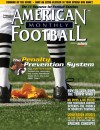Article CategoriesAFM Magazine
|
Blitzing Bad Memoriesby: Bob PalmerPeak Performance Coach © More from this issue Athletes require very selective short term memories in order to discard the negative feelings they get from mistakes or the stress of playing. As coaches, because we are working with such malleable athletic minds, we need to assist with this process, not reinforce the negative. Focusing on an athlete’s mistake—with ample doses of anger, frustration, dismissive-ness or sarcasm—creates athletes who are overly careful and fearful of making future mistakes. In football, as in most other sports, it is not the turnover that defeats you, it is the lack of mental recovery from the turnover that does.
|
|
|||||||
| HOME |
MAGAZINE |
SUBSCRIBE | ONLINE COLUMNISTS | COACHING VIDEOS |
Copyright 2025, AmericanFootballMonthly.com
All Rights Reserved





